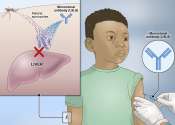Experimental malaria monoclonal antibody protective in Malian children
One injected dose of an experimental malaria monoclonal antibody was 77% effective against malaria disease in children in Mali during the country's six-month malaria season, according to the results of a mid-stage clinical ...
3 hours ago
0
2









